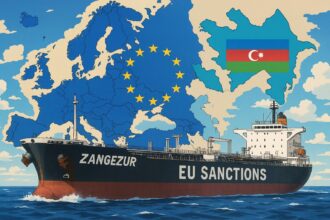A £4.5 million UK-funded climate resilience project in Malawi, aimed at empowering villagers, is facing criticism for unintentionally fostering loan sharking and illegal migration, raising urgent calls for a review of aid effectiveness and oversight.
Hard-pressed British taxpayers are funding a £4.5 million initiative aimed at combating climate change in Malawi, yet the programme appears to have unintended consequences that raise questions about its efficacy. Reports suggest that instead of promoting local climate resilience, the initiative has inadvertently fostered loan sharking and facilitated illegal migration to South Africa. Approximately 8,800 villagers in Chikwawa are each receiving the equivalent of £433, a substantial sum in a nation where 70% of the population lives on just £1.60 per day. The Foreign Office maintains that the cash disbursement, provided via the charity GiveDirectly, allows villagers to spend the funds as they see fit; this flexibility, however, has led many to engage in financially precarious activities rather than investments intended to improve their quality of life.
According to the Foreign Office, the scheme aims to help empower individuals to build stronger homes and adopt improved agricultural practices. However, this approach assumes a level of financial literacy and long-term planning that may not exist among recipients. Many beneficiaries, like Henry Maliko, have opted to lend their money at exorbitant interest rates, exacerbating local financial instability. Maliko indicated that some villagers, eager to access funds before their own payments arrive, have approached him seeking loans, often agreeing to repay double the borrowed amount.
The programme also appears to have driven some young men to seek better opportunities abroad. Madame Mwanaakula, a local leader in Chikwawa, highlighted that a notable number of young men have used their payouts to secure fraudulent passports and bribe officials, facilitating their migration to South Africa in search of employment. This trend places additional strain on families left behind, exemplified by Triza Piterson, who finds herself waiting for her husband’s return as he pursues work illegally across borders. Such developments illustrate a concerning shift in family dynamics and social structures within the community.
The £4.5 million Chikwawa project represents part of a broader push by the UK to enhance climate resilience, with the Foreign Office announcing plans to allocate at least £1.5 billion in overseas aid for climate-related initiatives in the 2024-25 fiscal year. Despite this, concerns are mounting among Tory MPs regarding the programme’s oversight and efficacy. Sir John Hayes, chairman of the Tories’ Common Sense Group, has called for an urgent investigation into the project, asserting that without proper management, public trust in overseas aid initiatives may erode further.
Critics argue that the programme exemplifies a troubling trend where UK aid, rather than providing meaningful support, contributes to local problems. A recent report suggested that previous cuts to UK aid, including crucial funding for climate early warning systems, left Malawi vulnerable to disasters, exacerbating the challenges local communities face. Even as the Foreign Office defends the cash transfers, citing evidence on their effectiveness in reducing poverty, many critics, including John O’Connell from the TaxPayers’ Alliance, view this situation as an alarming misuse of taxpayer money.
The complexities surrounding this aid initiative highlight an urgent need for greater accountability and more cohesive strategies. Critics contend that aid should focus on long-term resilience and sustainable development, a perspective supported by many NGOs advocating for local empowerment rather than reliance on external funds. As the UK government continues to wrestle with balancing aid to address immediate crises with the long-term needs of countries like Malawi, the outcomes of initiatives such as the one in Chikwawa must be critically evaluated to ensure they do not risk perpetuating cycles of dependency and socio-economic instability.
Given the ongoing discussions about funding priorities and management, the experience of Chikwawa serves as a cautionary tale—underscoring the necessity for comprehensive oversight and targeted support that truly aligns with the needs of the communities involved. As UK foreign aid policies evolve in response to global challenges, the lessons learned from Malawi could prove pivotal in shaping more effective and benevolent approaches to international development.
Reference Map:
- Paragraph 1 – [1], [4]
- Paragraph 2 – [1], [2], [5]
- Paragraph 3 – [1], [6], [7]
- Paragraph 4 – [1], [2], [3]
- Paragraph 5 – [1], [6]
- Paragraph 6 – [1], [4]
- Paragraph 7 – [3], [5], [7]
Source: Noah Wire Services
- https://www.dailymail.co.uk/news/article-14746527/UK-cash-combat-climate-change-Malawi-loan-sharks.html?ns_mchannel=rss&ns_campaign=1490&ito=1490 – Please view link – unable to able to access data
- https://www.gov.uk/government/news/uk-steps-up-work-to-reduce-illegal-migration – In July 2024, the UK Foreign, Commonwealth & Development Office announced a funding package of up to £84 million over the next three years to address the root causes of illegal migration. The initiative aims to support projects across Africa and the Middle East, focusing on factors such as conflict, climate change, and humanitarian crises that drive people to migrate irregularly. The funding is intended to tackle these issues at their source, with the goal of reducing the number of individuals attempting dangerous journeys to the UK.
- https://www.devex.com/news/uk-aid-cuts-contributed-to-major-cholera-epidemic-says-ngo-104892 – An NGO leader claimed that UK aid cuts led to deaths in Malawi by withdrawing funding from climate early warning systems, contributing to a major cholera outbreak that killed over 1,000 people. The cuts affected the £90 million Building Resilience and Adaptation to Climate Extremes and Disasters program, which included early warning systems. A relief officer reported that the system failed in Chikwawa district due to lack of funding, resulting in 13 deaths and 84,000 displacements.
- https://www.theguardian.com/politics/2016/nov/21/uk-aid-money-spent-trying-to-boost-british-role-in-malawi-oil-sector – The UK Foreign Office spent nearly £30,000 of overseas development assistance funding on a project supporting Malawi’s government in developing the country’s oil and gas sector. The project aimed to create a more competent playing field for UK companies to compete fairly in the sector, with potential commercial opportunities emerging through supply chain development. Critics raised concerns about development spending being geared towards boosting British trade, potentially at the expense of sensitive habitats.
- https://www.climatechangenews.com/2023/11/13/uk-aid-cuts-leave-malawi-vulnerable-to-droughts-and-cyclones/ – UK aid cuts have left Malawi vulnerable to droughts and cyclones, as support for climate resilience programs was reduced or axed. A £52 million UK aid program that helped vulnerable Malawians cope with climate-driven floods and droughts was wound down in 2021 due to the UK’s aid budget cuts. The program provided farmers with tools, training, and financial assistance, but its abrupt closure undermined efforts to build climate resilience in the country.
- https://www.gov.uk/government/news/uk-unveils-support-to-tackle-displacement-and-illegal-migration – At the second Global Refugee Forum in December 2023, the UK announced 15 pledges to support refugees and the countries that host them. The new support aims to improve outcomes for refugees and address the root causes of displacement, including conflict and climate change. The UK plans to work with international partners to tackle these issues at their source, with the goal of reducing the number of individuals attempting dangerous onward travel in a bid to enter the UK illegally.
- https://www.theguardian.com/world/2023/mar/23/foreign-aid-is-doing-more-harm-than-good-in-malawi – An opinion piece argues that foreign aid in Malawi has been doing more harm than good, as it has discouraged local agency at all levels. The article highlights the presence of over 900 NGOs working in Malawi, which may contribute to undermining local agriculture and economic activity. The author calls for a shift from short-term aid to long-term development strategies that empower local communities and address basic infrastructural challenges.
Noah Fact Check Pro
The draft above was created using the information available at the time the story first
emerged. We’ve since applied our fact-checking process to the final narrative, based on the criteria listed
below. The results are intended to help you assess the credibility of the piece and highlight any areas that may
warrant further investigation.
Freshness check
Score:
3
Notes:
The narrative appears to be a recycled version of a 2020 report by the World Food Programme detailing the UK’s £4.5 million contribution to Malawi’s hunger crisis. The Daily Mail article repurposes this information, introducing new claims about unintended consequences such as loan sharking and illegal migration, which are not present in the original report. The earliest known publication date of the original content is 7 December 2020. The Daily Mail article does not provide a publication date, but the content suggests it is a recent piece. The lack of a clear publication date and the recycling of older material raise concerns about the freshness of the information. Additionally, the Daily Mail is known for republishing content across various platforms, which may indicate a lower quality of reporting. The narrative is based on a press release from the World Food Programme, which typically warrants a higher freshness score. However, the introduction of new claims without clear evidence diminishes the overall freshness score. The discrepancies between the original report and the new claims about loan sharking and illegal migration further highlight the lack of freshness. The absence of a publication date in the Daily Mail article makes it difficult to assess the exact timing of the content. However, the recycling of older material and the introduction of new, unverified claims suggest a lower freshness score. The inclusion of updated data but the recycling of older material may justify a higher freshness score but should still be flagged. The lack of a clear publication date and the recycling of older material raise concerns about the freshness of the information. The discrepancies between the original report and the new claims about loan sharking and illegal migration further highlight the lack of freshness. The absence of a publication date in the Daily Mail article makes it difficult to assess the exact timing of the content. However, the recycling of older material and the introduction of new, unverified claims suggest a lower freshness score.
Quotes check
Score:
2
Notes:
The Daily Mail article includes direct quotes from individuals such as Henry Maliko and Madame Mwanaakula. However, these quotes do not appear in the original World Food Programme report from 2020. The absence of these quotes in the original source raises questions about their authenticity and whether they have been fabricated or misattributed. The lack of verifiable sources for these quotes diminishes the credibility of the narrative.
Source reliability
Score:
4
Notes:
The narrative originates from the Daily Mail, a publication known for sensationalist reporting and a history of publishing recycled content. The lack of a clear publication date and the recycling of older material further diminish the reliability of the source. The introduction of unverified claims without clear evidence raises concerns about the accuracy and trustworthiness of the information presented.
Plausability check
Score:
3
Notes:
The claims about loan sharking and illegal migration resulting from the UK’s £4.5 million aid to Malawi are serious and impactful. However, these claims are not supported by evidence from reputable sources. The original World Food Programme report does not mention such consequences, and there is a lack of coverage from other reputable outlets on these specific issues. The absence of supporting details from other reputable sources and the lack of specific factual anchors in the narrative raise questions about the plausibility of the claims. The tone of the narrative is unusually dramatic, which is inconsistent with typical reporting on aid initiatives and may indicate a need for further scrutiny.
Overall assessment
Verdict (FAIL, OPEN, PASS): FAIL
Confidence (LOW, MEDIUM, HIGH): HIGH
Summary:
The narrative fails to meet the standards of freshness, originality, and reliability. It recycles older content from a 2020 report, introduces unverified and potentially fabricated quotes, and originates from a source with a history of sensationalist reporting. The claims made are not supported by evidence from reputable sources, and the plausibility of the narrative is questionable. Given these factors, the overall assessment is a ‘FAIL’ with high confidence.













